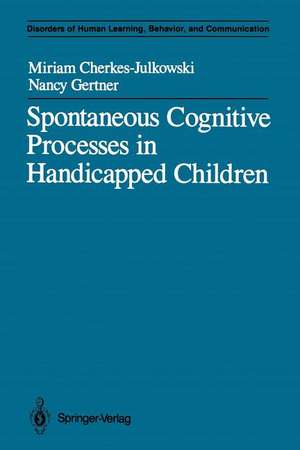Spontaneous Cognitive Processes in Handicapped Children: Disorders of Human Learning, Behavior, and Communication
Autor Miriam Cherkes-Julkowski, Nancy Gertneren Limba Engleză Paperback – 8 noi 2011
Preț: 381.81 lei
Nou
Puncte Express: 573
Preț estimativ în valută:
73.08€ • 79.41$ • 61.43£
73.08€ • 79.41$ • 61.43£
Carte tipărită la comandă
Livrare economică 21 aprilie-05 mai
Preluare comenzi: 021 569.72.76
Specificații
ISBN-13: 9781461388067
ISBN-10: 1461388066
Pagini: 184
Ilustrații: X, 171 p.
Dimensiuni: 155 x 235 x 10 mm
Greutate: 0.27 kg
Ediția:Softcover reprint of the original 1st ed. 1989
Editura: Springer
Colecția Springer
Seria Disorders of Human Learning, Behavior, and Communication
Locul publicării:New York, NY, United States
ISBN-10: 1461388066
Pagini: 184
Ilustrații: X, 171 p.
Dimensiuni: 155 x 235 x 10 mm
Greutate: 0.27 kg
Ediția:Softcover reprint of the original 1st ed. 1989
Editura: Springer
Colecția Springer
Seria Disorders of Human Learning, Behavior, and Communication
Locul publicării:New York, NY, United States
Public țintă
ResearchCuprins
1 Cogito Ergo Sum.- Developmental Equivalence.- What Develops?.- Implications for Atypical Populations.- “Typical” Development.- Instruction Based on a Developmental Versus Difference Model.- 2 To Err Is Human, to Reorganize Divine.- Error Production as an Outcome of Data Reduction.- Error Production as Evidence of Cognitive Competence.- Error Detection and Correction.- “Error-Free” Learning and Passivity.- Error Commission and Regression.- Error Production as a Key to Assessment and Instruction.- Diagnosing Patterns of Correct and Incorrect Responses.- Examining the Nature of Incorrect Responses.- Summary.- 3 Self-Selected Strategies.- Strategic Behavior.- Strategic Behavior in Cognitively Impaired Versus Nonimpaired Populations.- Determinants of Strategic Behavior.- Metacognitive Passivity.- Misguided Attention.- Knowledge Structure and Attention.- Context and Attention.- Vagueness, Imprecision, and Strategic Behavior.- Environmental Contribution to Passivity and Imprecision.- Spontaneous Strategy Generation.- “Good” Strategies Redefined.- Conclusion.- 4 Man Is the Measure of All Things.- Measurement of Strategy Usage.- Direct Measures of Strategy Performance.- Memory.- Problem Solving.- Academic Skills.- Verbal Strategies.- Indirect Methods of Measurement.- The Adequacy of Verbal Reports.- Verbal Reports as Measures of Strategy Usage.- Group Setting as a Medium for Observing Strategic Behavior.- Conclusion.- 5 No Man Is an Island.- Evolution of Cognitive Processes Under Adult Guidance.- Peer Tutoring.- Group Interaction.- Social Skills of Learning-Disabled Children.- 6 How Can I Know What I Think Till I See What I Say?.- Group Condition.- Group and Individual Conditions.- Relationship Between Strategy Usage and Performance.- Metacognition.- GroupInteraction.- Responses to Different Stimulus Types.- Summary and Implications.- 7 Back to the Classroom.- Flexible Programming.- Social Cognition and Group Instruction.- Social Cognition and Apprenticeship.- Ceding Cognitive Control to the Child.- Adapting to the Child’s Characteristics.- Metacognitive Interventions.- Instructional Needs of Slow Learners.- Mainstreaming.- Conclusion.- Appendix A: Stimulus Materials.- Appendix B: Strategy Scoring System.- References.- Author Index.


































